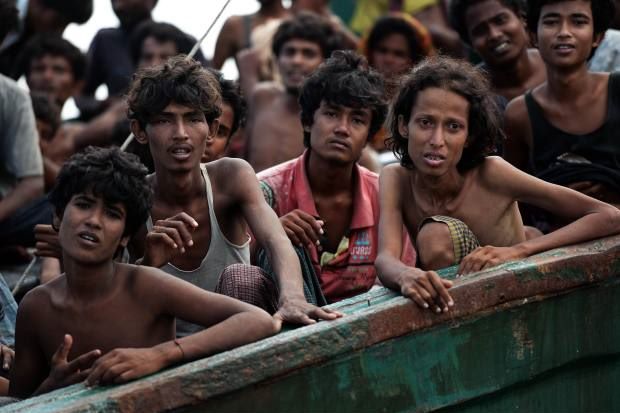
A file picture of Rohingya migrant men from Myanmar on a drifting boat in the Thai waters off the southern island of Koh Lipe in the Andaman on May 14, 2015. – AFP
Moderate Buddhists should come up strongly to condemn what extremist personalities and groups are doing in Myanmar.
ULTRA nationalist groups and religious extremists, by themselves, are bad enough, but when brought together by a common agenda, you have the most potent brew possible.
These elements always fight in the name of country, race and religion. Tolerance and acceptance are not in their vocabulary, and they justify their ends with the most intolerant means, never mind that we all believe that all religions preach about peace and harmony.
It’s very simple – politics have no place for religious figures, especially when they come dressed in their full religious regalia.
When men speak on politics, supposedly on behalf of God, or give such an impression, that is the beginning of trouble.
The reality is few people dare to challenge these religious figures, who not only claim to speak in the name of God, but pass themselves off as experts whose interpretation of doctrines is final. To challenge them would be to risk the wrath of the community, especially in conservative societies.
Because it is regarded as a sin to question these religious figures, who are actually mere mortals elevated to near demi God status by their adherents, they can get away with the most demonic crimes.
All religions have their extremists, whether Islam, Christianity, Judaism, Hinduism or Buddhism.
The world is now shocked to see videos of Myanmar monks making hate speeches and, in some cases, actually taking part in racial and religious violence.
It is one thing to develop a dislike or prejudice against the Rohingya people, who are Muslims, but to actually instigate an act of violence against them is a gross violation of human decency and rationality.
I have tried to understand why the Myanmar are so angry with these Rohingya that they do not count them as one of the recognised people of the country.
Surely, it cannot just be because they are Muslims because Yangon and Mandalay, two cities most Malaysians are familiar with, are filled with Muslims. Buddhists and Muslims have co-existed for centuries.
Some of the reasons given, at least from social media, seem bizarre with accusations of rape by Rohingya against Buddhist girls, and amassment of weapons. It sounds ridiculous. Perhaps we do not know Myanmar politics well enough but those who put up their case against the Rohingya are not doing a good job.
The Rohingya have found themselves in a tight spot and are fleeing the country. Indonesia and Malaysia, under pressure from the international community amid growing calls for humanitarian aid and compassion, have given in to housing the latest refugees numbering some 7,000 temporarily for a year.
But the likelihood is that both countries will end up stuck with this mixture of Rohingya and Bangladeshis after that. Turkey is said to be interested in them but let’s see whether that happens. Thailand has walked away from the Asean Foreign Ministers’ meeting uncommitted and has remained so until today while Australia has shut the door.
But much more troubling is the continuing dominance of the extremist Myanmar monks led by Arshin Wirantu, who heads the ultra-nationalist 969 movement.
Wirathu spent nine years in prison after being sentenced in 2003 for inciting religious conflict, but has continued to amplify his campaign since his release.
Recently, Wirathu created international headlines when he called Yanghee Lee, Myanmar’s UN special rapporteur, “a whore” and “bitch” after she objected to controversial draft legislation.
But what is disappointing is that while many are quick to condemn Islamic groups which carry out extremist acts, there is a deafening silence when it comes to speaking out against these extremist Myanmar Buddhist monks?
Where are our local non-government organisations and politicians who are often quick in condemning Islamic terrorist acts?
Surely these Buddhist extremists are no different. They have forgotten that monks should be preaching reconciliation, forgiveness and tolerance instead of hate and violence.
It is always easier to point out the weakness and failure of another community and religion but when it involves our own kind, many prefer to look the other way, shamefully. But we cannot be racially or religious selectively. What is right is right and what is wrong is wrong.
Surely, this madness of burning and killing cannot be right, no matter how much one dislikes another race.
And at a higher level, we also want strong voices to speak out. In this context, the Dalai Lama should be commended for speaking out – and also asking that fellow Nobel Peace Laureate Aung San Syu Kyi to do more to help the persecuted Rohingya Muslims in her country, Myanmar.
These Myanmar extremist monks are giving Buddhism a bad name. Surely this is not what Buddhism is about.
But it will help if moderate Buddhists all over the world come up strongly to condemn what these extremist personalities and groups are doing in Myanmar, whipping up the emotions of the people in Myanmar by feeding on their ignorance and prejudices.
The bottom line is that men of the faith should practise faithfully what they preach. Politics and religion simply cannot mix.





